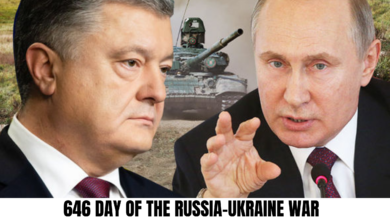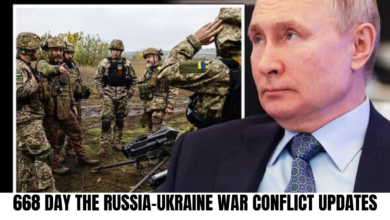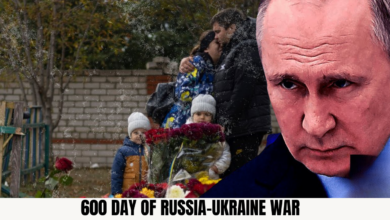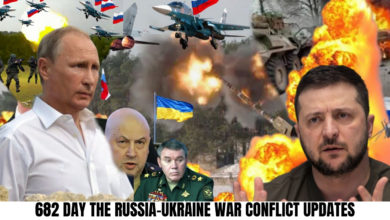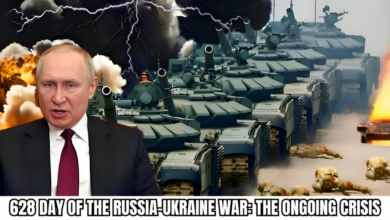23-year-old Indian ‘helper’ from Gujarat dies in Russian war zone
The incident of an 23-year-old Indian national Hemil Ashvinbhai Mangukiya employed by the Russian Army being killed in an air strike in Donetsk, Ukraine, brings to light the challenges faced by individuals working in conflict zones. Foreign workers, including many Indian nationals, often find themselves in precarious situations, risking their lives in order to make a living.
The ongoing conflict in Donetsk has created a dangerous and unpredictable environment where civilians and foreign workers are caught in the crossfire. This article delves into the details of the air strike incident, its impact on the Indian national community, the response from the Indian government and diplomatic efforts, the challenges faced by Indian nationals working in conflict zones, safety measures for Indian nationals abroad, support and resources available for affected families, international reactions, and the future implications of such incidents.
Details of the Air Strike Incident : 23-year-old Indian worker Hemil
The air strike that claimed the life of the 23-year-old Indian worker Hemil Ashvinbhai Mangukiya in Donetsk serves as a grim reminder of the devastating consequences of war. It is a tragic incident that highlights the dangers faced by individuals working in conflict zones. The details surrounding the air strike are still emerging, but it is clear that the incident has had a profound impact on the Indian national community in Donetsk. The loss of a life in such circumstances is a stark reminder of the fragility of human existence in the midst of violence and conflict.

The air strike, which targeted a location in Donetsk, resulted in the death of the 23-year-old Indian worker Hemil Ashvinbhai Mangukiya and further intensified the already dire situation in the region. The indiscriminate nature of such attacks underscores the urgent need for a peaceful resolution to the conflict and the establishment of mechanisms to ensure the safety and security of all individuals involved.
Impact on the Indian National Community
The tragic incident has had a significant impact on the Indian national community in Donetsk. Many Indian workers are still employed by the Russian Army in the conflict-torn city, and this incident has sent shockwaves through the community. The loss of a fellow compatriot ( 23-year-old Indian worker Hemil Ashvinbhai Mangukiya ) has not only left them grieving but has also raised concerns about their own safety. The incident serves as a stark reminder of the risks they willingly or unwillingly undertake in order to earn a livelihood in a volatile region.
The Indian community in Donetsk is now grappling with the aftermath of the air strike. Families of the affected workers are left devastated, and the incident has created a sense of fear and uncertainty among the Indian nationals still employed in the city. The tragedy has also prompted discussions within the community about the necessity of working in conflict zones and the need for better safety measures and support systems.
Response from the Indian Government and Diplomatic Efforts
In the wake of the air strike incident, the Indian government has expressed deep condolences to the family of the deceased ( 23-year-old Indian worker Hemil Ashvinbhai Mangukiya ) and has taken steps to ensure the safety and well-being of Indian nationals in Donetsk. The Ministry of External Affairs has been in contact with the Russian authorities to gather more information about the incident and to seek assurances regarding the safety of Indian workers in the region.
Diplomatic efforts are underway to address the situation and explore avenues for a peaceful resolution to the conflict in Donetsk. The Indian government is actively engaging with international partners and stakeholders to raise awareness about the risks faced by Indian nationals and to advocate for their safety. The incident has highlighted the need for diplomatic interventions to protect the lives and livelihoods of those working in conflict zones.
Challenges Faced by Indian Nationals Working in Conflict Zones
Working in conflict zones presents numerous challenges for Indian nationals and other foreign workers. The volatile and unpredictable nature of these zones puts their safety and security at risk on a daily basis. Living and working under constant threat can take a toll on their mental and physical well-being. Moreover, the lack of adequate support systems and the limited access to resources further exacerbate the challenges they face.
Language and cultural barriers also pose significant challenges for Indian nationals working in conflict zones. Communication becomes a hurdle, making it difficult for them to navigate through their daily lives and seek assistance when needed. The unfamiliarity with local customs and practices can lead to misunderstandings and further isolate them from the local community.
Safety Measures for Indian Nationals Working Abroad
In order to mitigate the risks faced by Indian nationals working in conflict zones, it is crucial to establish robust safety measures. The Indian government, in collaboration with international organizations, should provide comprehensive training and orientation programs to prepare individuals for the challenges they may encounter in such environments. This includes imparting knowledge about security protocols, emergency procedures, and basic self-defense techniques.
Employers should also play an active role in ensuring the safety and well-being of their employees. They must invest in adequate security measures, including the provision of protective gear and regular security assessments of the work environment. Regular communication channels should be established to keep employees informed about any potential risks and to provide timely updates and support.
Support and Resources for Affected Families
The tragic incident in Donetsk has left families of the affected workers devastated and in need of support. The Indian government should provide comprehensive assistance to the families, including financial support, counseling services, and legal guidance. This would help alleviate their immediate concerns and provide them with the necessary resources to navigate through this difficult time.
Additionally, the government should establish channels for ongoing support and communication with the families, ensuring that their needs are met and that they are kept informed about any developments related to the incident. Collaborating with local organizations and NGOs can further enhance the support provided to the affected families.
International Reactions and Calls for Investigation
The air strike incident in Donetsk has drawn international attention and condemnation. The loss of a life, especially that of a foreign worker ( 23-year-old Indian worker Hemil Ashvinbhai Mangukiya ) , underscores the need for a thorough investigation into the circumstances surrounding the incident. Various countries and international organizations have called for an impartial inquiry to determine the responsibility for the air strike and to hold those accountable for the loss of life.
The incident has also prompted discussions about the larger implications of working in conflict zones and the responsibilities of employers and governments in ensuring the safety and well-being of foreign workers. It serves as a wake-up call for the international community to address the risks faced by individuals working in such environments and to strengthen mechanisms for their protection.
Conclusion and Future Implications
The tragic air strike incident in Donetsk, resulting in the death of 23-year-old Indian worker Hemil Ashvinbhai Mangukiya employed by the Russian Army, serves as a stark reminder of the dangers faced by individuals working in conflict zones. The incident highlights the urgent need for a peaceful resolution to the conflict in Donetsk and the importance of ensuring the safety and security of all individuals involved.
It is imperative that the Indian government continues its diplomatic efforts to address the situation and advocate for the safety of Indian nationals in Donetsk. The challenges faced by Indian nationals working in conflict zones should be acknowledged, and comprehensive measures should be taken to mitigate the risks they face. The incident also underscores the need for international cooperation in addressing the larger issue of working in conflict zones and protecting the lives and livelihoods of foreign workers.
Ultimately, the tragic loss of a life in Donetsk should serve as a catalyst for renewed efforts to bring an end to the violence and restore stability in the region. The incident should not be forgotten, but rather used as a reminder of the harsh realities faced by individuals caught in war-torn areas and as a driving force behind diplomatic efforts to create a safer and more secure world for all.




